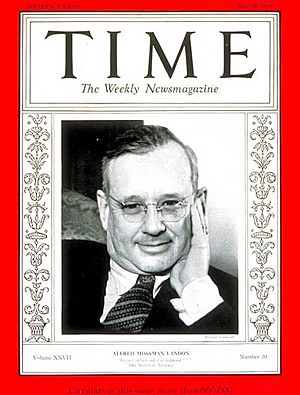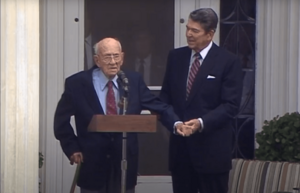Alf Landon facts for kids
Quick facts for kids
Alf Landon
|
|
|---|---|

Landon, c. 1936
|
|
| 26th Governor of Kansas | |
| In office January 9, 1933 – January 11, 1937 |
|
| Lieutenant | Charles Thompson |
| Preceded by | Harry Woodring |
| Succeeded by | Walter Huxman |
| Chairman of the Kansas Republican Party | |
| In office August 27, 1928 – August 26, 1930 |
|
| Preceded by | Seth G. Wells |
| Succeeded by | John Hamilton |
| Personal details | |
| Born |
Alfred Mossman Landon
September 9, 1887 West Middlesex, Pennsylvania, U.S. |
| Died | October 12, 1987 (aged 100) Topeka, Kansas, U.S. |
| Resting place | Mount Hope Cemetery |
| Political party | Republican |
| Other political affiliations |
Progressive "Bull Moose" |
| Spouses |
|
| Children | 3, including Nancy |
| Education | University of Kansas (LLB) |
| Profession | Oil producer |
| Military service | |
| Allegiance | |
| Branch/service | |
| Years of service | 1918–1919 |
| Rank | |
| Unit | Chemical Corps |
| Battles/wars | World War I |
Alfred Mossman Landon (September 9, 1887 – October 12, 1987) was an American oil businessman and politician. He served as the 26th governor of Kansas from 1933 to 1937. As a member of the Republican Party, he ran for president in 1936. However, he lost by a lot to the sitting President, Franklin D. Roosevelt.
Landon was born in West Middlesex, Pennsylvania. He spent most of his childhood in Marietta, Ohio, before moving to Kansas. After finishing college at the University of Kansas, he started his own oil business. This business made him a millionaire. He became a leader among the more open-minded Republicans in Kansas. Landon was elected Governor of Kansas in 1932. He worked to lower taxes and balance the state's budget during the Great Depression. He liked many parts of President Roosevelt's "New Deal" plan. But he also thought some parts were wasteful.
In 1936, the Republican Party chose Landon to run for president. He wasn't a very strong campaigner. He only won two states in the election. After his term as governor ended, he never ran for public office again. Later in his life, he supported important programs like the Marshall Plan. He also supported President Lyndon B. Johnson's "Great Society" programs. He started a series of talks at Kansas State University, now called the Landon Lecture Series. Alf Landon lived to be 100 years old. He passed away in Topeka, Kansas, in 1987. His daughter, Nancy Kassebaum, later became a U.S. Senator for Kansas.
Contents
Early Life and Education
Alfred Landon was born in 1887 in West Middlesex, Pennsylvania. His parents were Anne Mossman and John Manuel Landon. He grew up in Marietta, Ohio. When he was 17, his family moved to Kansas. He graduated from the University of Kansas in 1908.
Landon first tried a career in banking. But in 1912, he became an independent oil producer in Independence, Kansas. During World War I, he joined the Army. He became an officer in the Chemical Corps and reached the rank of captain. The war ended before he could go to France. So, he was discharged and went back to Kansas. By 1929, his oil business had made him a millionaire. He helped create a big oil and gas group called the Mid-Continent Oil and Gas Association. This group worked to represent the oil industry.
Landon was married to Margaret Fleming. She passed away in 1918.
Political Career and Governor of Kansas
Landon supported Theodore Roosevelt's Progressive Party in 1912. By 1922, he was a private secretary to the governor of Kansas. He became known as a leader of the more open-minded Republicans in the state. In 1928, he was chosen as the chairman of the Republican state committee. He helped the Republican Party win the presidential and governor elections in Kansas that year.
In 1932, Landon decided to run for Governor of Kansas. He wanted to bring the Republican Party in Kansas back together. He won the election, beating the sitting governor, Harry Woodring. He was re-elected governor in 1934. He and Governor Frank Merriam of California were the only Republican governors to be re-elected that year.
As governor, Landon became known for lowering taxes and balancing the state's budget. He was careful with money, but he also believed the government should help with social problems. He supported some parts of President Roosevelt's New Deal and also supported labor unions.
During his time as governor, Landon worked to help Kansas, which was struggling during the Great Depression. He also tried to strengthen the Republican Party. In 1936, he said his main goal was for the Republican Party to choose the best person for president. He also called for Kansas to join the federal social security program.
1936 Presidential Election Campaign

In 1936, Alf Landon decided to run for president against President Roosevelt. At the 1936 Republican National Convention, Landon's team helped him win the nomination. He won on the first try. The convention chose Frank Knox, a newspaper publisher, as his running mate.
Landon was not a very active campaigner. He rarely traveled to give speeches. Most of the criticisms against Roosevelt and Social Security came from other Republican campaigners, not from Landon himself. For two months after he was nominated, he didn't make any public appearances. A writer joked that there was a "mystery" about where he was.
Landon respected President Roosevelt. He also agreed with many parts of the New Deal. But he thought it was bad for businesses and that it wasted too much money. Later in the campaign, Landon said that Roosevelt was gaining too much power. He believed this was going against the U.S. Constitution.
The 1936 presidential election was a huge win for Roosevelt. Landon received almost 17 million votes. He even had the support of famous track star Jesse Owens. But he lost the popular vote by more than 10 million votes. He lost his home state of Kansas. He only won two states: Maine and Vermont. Roosevelt won 523 electoral votes, while Landon won only 8. On the same day, Republicans also lost the Kansas governorship. Roosevelt's victory was one of the biggest in U.S. history.
Later Life and Public Service
After his defeat, Landon finished his term as Governor of Kansas. He then went back to working in the oil industry. He never ran for elected office again.
The Republican Party faced many challenges after losing the 1932 and 1936 elections. Landon helped the party heal and find new leaders for the 1940 presidential campaign. He also tried to bring together different views on foreign policy. He turned down a job in President Roosevelt's Cabinet. He said he would only accept if Roosevelt promised not to run for a third term.
After war started in Europe in 1939, Landon spoke out against people who wanted the U.S. to stay out of the war. He worried that it would make Nazi Germany think the U.S. would not fight. In 1941, he argued against the Lend-Lease program. But he did suggest that the United Kingdom should be given $5 billion directly.
After the war, he supported the Marshall Plan, which helped rebuild Europe. He also spoke out against high spending at home. After the communist revolution in China, he was one of the first to say that the U.S. should recognize Mao Zedong's government. He also thought China should join the United Nations. This was not a popular idea at the time.
In 1961, Landon encouraged the United States to join the European Common Market. In 1962, he described his political ideas as "practical progressive." He said that political parties must understand the problems of a growing industrial society. He felt the Republican Party needed to be more aware of this. Later in the 1960s, Landon supported President Lyndon B. Johnson's programs like Medicare and other Great Society initiatives.
On December 13, 1966, Landon gave his first "Landon Lecture" at Kansas State University. This lecture series continues today. Many important world leaders and politicians have spoken there, including seven U.S. presidents. Landon also spoke at the Republican National Convention in 1976.
Final Years

President Ronald Reagan and his wife Nancy attended Landon's 100th birthday party. It was held at his home in Topeka, Kansas. President Reagan, who was 76, joked that it was a joy to go to a party for someone who could call him "a kid." Landon, using a walking stick, told everyone it was a great day to meet the President and Mrs. Reagan.
Alf Landon passed away in Topeka on October 12, 1987. This was 33 days after his 100th birthday. He is buried at Mount Hope Cemetery in Topeka, Kansas. At the time of his death, his second wife, Theo Cobb, was still alive.
Descendants
Landon's daughter, Nancy Landon Kassebaum, became a U.S. Senator for Kansas. She was elected in 1978 and re-elected in 1984 and 1990. Her second husband was Howard Henry Baker, Jr., who was also a U.S. Senator from Tennessee. Landon's nephew was actor Hal Landon Jr..
Images for kids
See also
 In Spanish: Alf Landon para niños
In Spanish: Alf Landon para niños
 | Misty Copeland |
 | Raven Wilkinson |
 | Debra Austin |
 | Aesha Ash |


